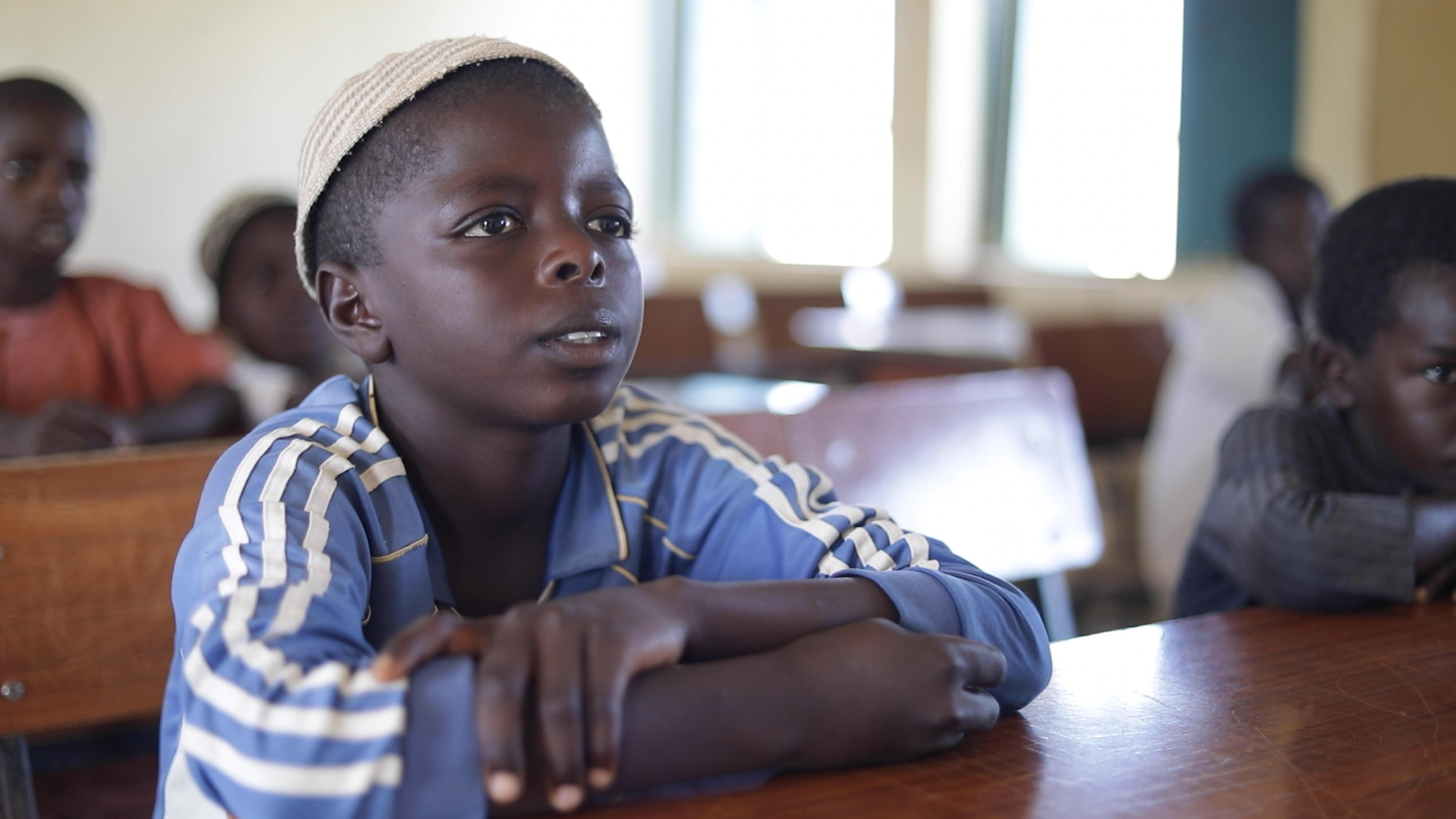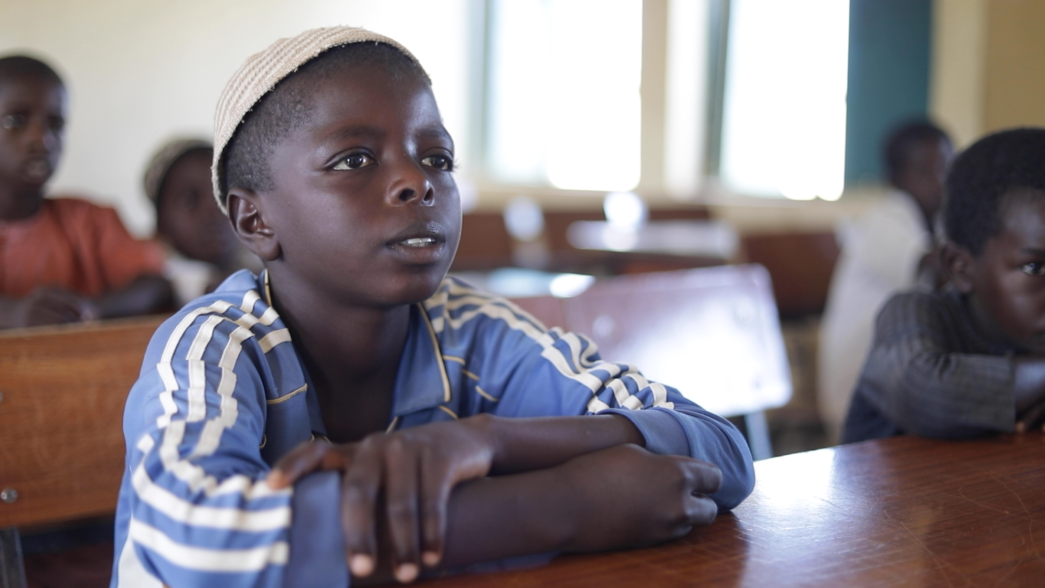A nomadic student, Jaafar Muhammed, at NPS Wuro Nyako in Kachia LGA of Kaduna State. | Photo By Samuel Adebanjo for TheCable.
The spectre of banditry has haunted Nigeria for years, casting a shadow of fear, carnage, and instability, particularly across its northern states. The human cost is staggering, the statistics horrifying. Once thriving communities are displaced and livelihoods are severely disrupted.
Parts of Nigeria, especially the north, have had a history of farmer-herder conflicts driven by the tussle for land and water resources. It is what slowly yielded a network of criminality that would come to be known as banditry.
Limited economic opportunities forced marginalised people into joining bandit groups as a means of survival. Inadequate law enforcement in remote rural communities created a vacuum that the bandits exploited.
The proliferation of small arms escalated the intensity of bandit attacks, with changing climate and stretching deserts worsening resource scarcity. Cattle rustling and abduction for ransom became lucrative, resulting in a cycle of almost never-ending bloodshed, reprisal attacks, and migration.
Today, Banditry is a composite crime that includes abduction, massacre, rape, cattle rustling, illegal firearms possession, and unlicensed mining.
Advertisement
Analysts say what served to catalyse banditry in Nigeria over a decade ago may no longer solely be what drives it.
Reports indicate that bandit culture has spread beyond its northwest roots. It is now affecting Taraba and Adamawa in the northeast, where it overlaps with insurgency, as well as Oyo, Ondo, Ogun, and Ekiti in the southwest.
A crime perception survey, published by Nigeria’s statistics office in 2024, estimated that 614,937 people were killed, with 2,235,954 kidnapping incidents recorded between May 2023 and April 2024. A staggering N2.23 trillion was paid as ransom, averaging about N2.7 million per incident.
Advertisement
Casualties of banditry have become a recurring feature in Nigeria’s news cycle, with a wave of strange killings recently being reported in Plateau and Ondo states.
The CDD gives an admittedly tenuous estimate of at least 100 bandit groups operating in Nigeria’s northwest alone, constituting between 10,000 and 30,000 armed militants. The bandits, it states, have predominantly been of Fulani extraction but also include Hausa, Kanuri, Tuareg, and other tribes.
Analysts say military crackdowns are crucial in the immediate response, but also warn that a more sustainable solution lies in addressing the root causes that make communities vulnerable to criminal indoctrination.
Among these, the chronic neglect of education for Nigeria’s nomads stands out as a critical, yet often overlooked, factor fueling the flames of banditry.
Advertisement
Mindful of the risk of undue ethnic profiling, the rise of banditry in regions with nomadic communities is not random. It is deeply intertwined with the socio-economic vulnerabilities that have historically stayed unaddressed.
Poverty, unemployment, and fierce competition over increasingly scarce resources create an environment where individuals, especially the youth, become susceptible to the lure of criminal activities.
In rural areas, where traditional livelihoods like cattle rearing thrive, livestock rustling has become a major economic crime, often committed by armed bandits. For pastoralist communities, the theft of their herds can be catastrophic, pushing them further into destitution and potentially into the ranks of bandits either for survival or retaliation.
This cycle of deprivation and violence is worsened by social dislocation and a sense of marginalisation. The attractive benefits from banditry, coupled with a pervasive loss of hope, can entice young people to join these gangs, seeking a semblance of socio-economic stability and a way out of poverty.
Advertisement
The staggering poverty index in the northwest, coupled with high youth underemployment rates, provides a stark illustration of this vulnerability.
This desperation is often exploited by criminal networks that thrive on the illegal trading of rustled livestock and the proliferation of illicit arms. The consequence is a breakdown of socio-economic activities, including farming and livestock rearing, further deepening the crisis.
Advertisement
Access to education for Nigeria’s nomadic children presents a vivid picture of disparity and neglect.
A recently published report, found here and here, accounted for a literacy rate of about 10 to 12 percent in Nigeria’s nomadic populations, with an estimated 5.5 million out-of-school nomadic children idling around huts.
Advertisement
This educational deprivation is a significant barrier to social mobility and economic growth.
The nomadic way of life, marked by migration in search of pasture and water, poses inherent challenges to traditional schooling systems.
Advertisement
The centrality of child labour within their trade also makes it exceedingly difficult for children to participate in formal schooling.
Although Nigeria established an agency to oversee nomadic education in 1989, its existing educational initiatives have been plagued by chronic underfunding, inadequate infrastructure, and a severe shortage of qualified teachers willing to work in often insecure remote locations.
The average school enrollment rate of nomadic children, sitting at 1.6 million, signals a massive pool of untapped potential and a significant vulnerability that can be exploited by criminal elements.
Even where nomadic schools exist, peculiar challenges often lead to low enrollment and high attrition rates.
This systemic failure to provide quality education perpetuates a cycle of illiteracy and limits the opportunities available to nomadic youth, making them more susceptible to the false promises of banditry.
Nigeria’s nomads have, for centuries, played a vital role in its informal economy through livestock rearing. But significant shifts in land use patterns, driven by agricultural expansion, deforestation, and the creation of protected areas, have dramatically reduced the availability of traditional grazing lands and disrupted age-old migration routes.
Persisting droughts and stretching deserts exacerbate these pressures, maintaining the intense competition for dwindling resources, particularly between pastoralists and farmers.
Nigeria’s shifting social structures have compounded environmental and economic stressors. The weakening of traditional authorities and inadequate state support left nomadic communities feeling increasingly marginalised, disenfranchised, and confined to the fringes of society.
This historical backdrop of resource scarcity, disrupted livelihoods, and a sense of neglect creates a fertile ground for grievances that can be exploited by bandit groups.
When traditional means of survival are threatened and communities feel abandoned by the state, the allure of illicit activities, offering a semblance of power and economic gain, can become dangerously appealing.
Policy experts and lawmakers are increasingly recognising the connection between education and security in Nigeria’s nomadic regions. There is a growing understanding that giving quality education to nomadic youth is indeed a powerful tool for conflict prevention and peacebuilding.
Education offers an alternative pathway to employment and a sense of purpose, thereby reducing the vulnerability of nomads to recruitment by bandit groups who often prey on the uneducated and unemployed.
Education can foster integration and understanding between nomads and other ethnicities in Nigeria, helping to bridge cultural divides and mitigate communal tensions that escalate into violence. By equipping individuals with critical thinking, education can also promote a rejection of violence as a means to address grievances, fostering a culture of peace and tolerance.
As Nigeria’s Senate President Godswill Akpabio aptly warned, the unschooled children of today risk becoming the terrorists of tomorrow.
The fact that bandits have targeted schools highlights the threat they perceive from an educated populace because schooling makes people less susceptible to manipulation and control.
Nigeria can learn from countries that have successfully tackled challenges related to marginalised nomadic populations who are involved in conflict. For instance, Mongolia scored some success in providing formal education to its nomadic population through state-sponsored residential schools.
Uganda’s “Alternative Basic Education for Karamoja” is another compelling example that demonstrates flexible learning hours, a culturally relevant curriculum co-written by the community, and the use of local teachers in reaching nomadic pastoralists.
Kenya also experimented with mobile schools and distance learning after recognising the need for flexible delivery models to cater to its nomads.
Experiences from Afghanistan with mobile schools and radio-based learning for Kuchi children are there to cite. Niger’s model school in nomad zones, supported by UNICEF, also exemplify the potential of innovative approaches in reaching remote and mobile communities.
A combination of strong state support, community involvement, culturally sensitive curricula, and flexible delivery methods is a crucial ingredient for successful nomadic education programmes in conflict-prone regions.
Education can break the cycle of banditry in Nigeria’s nomadic regions. By providing relevant skills and knowledge, it potentially opens doors to alternative livelihoods beyond traditional pastoralism, which is increasingly vulnerable to environmental changes and resource conflicts.
Literacy and numeracy skills, coupled with sustained vocational training, can equip nomadic youth with the means to participate in the modern economy, reducing their economic vulnerability and the temptation to engage in banditry.
Education fosters a sense of belonging. Bringing nomadic children into contact with their peers from other communities through education can dismantle feelings of marginalisation and resentment that fuel conflict.
Education cultivates critical thinking and problem-solving skills, helping individuals to analyse issues, understand different perspectives, and seek peaceful resolutions to conflicts.
Although quantitative data directly linking educational levels in nomadic communities to involvement in banditry is limited, the devastating impact of banditry in regions with low educational attainment among nomadic populations suggests an indirect relationship.
Providing quality education to nomadic communities in Nigeria is fraught with logistical, cultural, and political challenges.
The highly mobile nature of nomadic life necessitates flexible and innovative school models, such as mobile schools and distance learning schemes, which require investment in infrastructure and technology in often remote and inaccessible areas.
Recruiting and retaining qualified teachers in these environments is a persistent challenge, requiring improved incentives, adequate training, and enhanced security.
Since traditional nomadic livelihoods are ingrained, culturally sensitive curricula that incorporate local languages, traditions, and skills relevant to nomadic life will ensure the value of education is recognised within these communities.
It all requires strong political will, sustained funding, and coordination between all levels of government, as well as collaboration with CSOs and foreign partners.
The war against banditry in Nigeria demands a comprehensive strategy that goes beyond military crackdown and tackles the underlying social, economic, and educational vulnerabilities that fuel the crisis.
Educating Nigeria’s nomadic population is not a matter of social justice. It is an imperative for national security.
Views expressed by contributors are strictly personal and not of TheCable.



